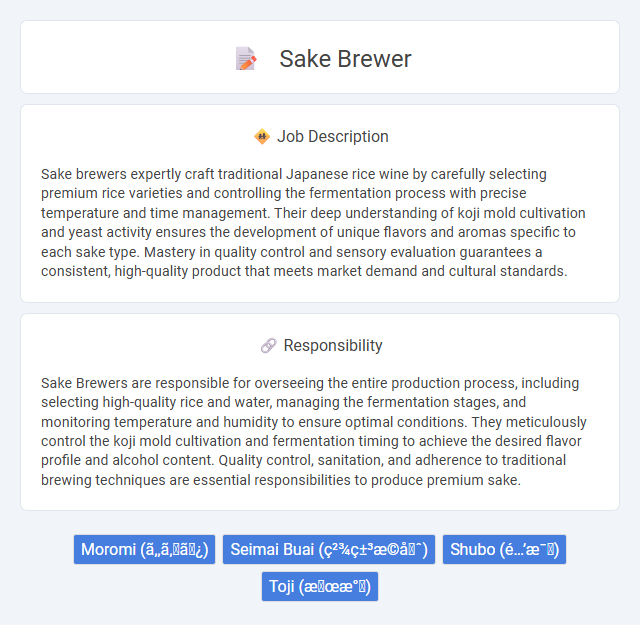
Sake brewers expertly craft traditional Japanese rice wine by carefully selecting premium rice varieties and controlling the fermentation process with precise temperature and time management. Their deep understanding of koji mold cultivation and yeast activity ensures the development of unique flavors and aromas specific to each sake type. Mastery in quality control and sensory evaluation guarantees a consistent, high-quality product that meets market demand and cultural standards.
Individuals with a passion for fermentation and attention to detail are likely to thrive as sake brewers, given the precise nature of the brewing process. Those who can handle physically demanding tasks and work in environments with fluctuating temperatures may find this profession suitable. However, people who prefer less repetitive, more varied work or have sensitivity to such conditions might find the job challenging.
Qualification
Sake brewers must possess in-depth knowledge of fermentation processes, rice polishing ratios, and koji mold cultivation to ensure high-quality production. Practical experience in monitoring temperature, humidity, and yeast activity during brewing is essential to maintain flavor consistency and alcohol balance. Strong attention to detail, combined with formal training or certification in brewing science or traditional sake brewing techniques, significantly enhances a candidate's qualifications.
Responsibility
Sake Brewers are responsible for overseeing the entire production process, including selecting high-quality rice and water, managing the fermentation stages, and monitoring temperature and humidity to ensure optimal conditions. They meticulously control the koji mold cultivation and fermentation timing to achieve the desired flavor profile and alcohol content. Quality control, sanitation, and adherence to traditional brewing techniques are essential responsibilities to produce premium sake.
Benefit
Sake brewers probably enjoy the benefit of working in a specialized craft industry that values traditional skills alongside innovative techniques. The job may offer opportunities for creative expression in developing unique flavors and blends, potentially leading to recognition within the beverage community. Working as a sake brewer could also provide a fulfilling career with cultural significance and steady demand in markets appreciating authentic Japanese products.
Challenge
Challenges in the sake brewer job likely involve mastering the delicate fermentation process to achieve consistent flavor profiles under varying environmental conditions. There is a high probability that managing the balance between traditional techniques and modern efficiency presents ongoing difficulties. Maintaining quality while adapting to fluctuating raw material availability and seasonal variations could also be significant obstacles in this role.
Career Advancement
Sake brewers develop expertise in fermentation techniques, allowing for mastery in crafting premium sake varieties. Advancing in this career often involves roles such as Head Brewer, overseeing production quality and innovation in breweries. Continuous learning about rice polishing ratios, yeast strains, and brewing technology enhances opportunities for leadership and international recognition within the sake industry.
Key Terms
Moromi (もろみ)
Sake brewers meticulously monitor Moromi, the fermenting mash of steamed rice, koji mold, and water that forms the foundation of sake production. They control temperature and fermentation time to optimize enzyme activity and yeast metabolism, crucial for developing the complex flavors and alcohol content in Moromi. Skilled management of Moromi's acidity and sugar levels ensures the final sake's balance, aroma, and quality.
Seimai Buai (精米歩合)
The Sake Brewer expertly manages the Seimai Buai (Jing Mi Bu He ), the rice polishing ratio that significantly influences flavor and aroma by determining the extent to which rice grains are milled before fermentation. Precise control over the Seimai Buai ensures removal of outer layers containing fats and proteins, resulting in a cleaner, more refined taste essential for premium-grade sake. Mastery in balancing Seimai Buai with other brewing parameters directly impacts the sake's classification and consumer appeal in competitive markets.
Shubo (酒母)
Shubo, also known as the yeast starter, is a critical stage in sake brewing where the growth of yeast is carefully cultivated to ensure fermentation quality and flavor development. Skilled sake brewers monitor temperature, acidity, and yeast activity in the shubo to create a strong and healthy yeast culture essential for producing rich and balanced sake. Expertise in managing the shubo phase directly impacts the aroma, taste, and overall character of the final sake product.
Toji (杜氏)
A Toji (Du Shi ) is the master brewer responsible for overseeing the entire sake production process, ensuring the highest quality through precise control of fermentation, temperature, and ingredient selection. Expert knowledge of rice polishing ratios, yeast strains, and water chemistry is essential for crafting premium sake varieties. A skilled Toji combines tradition with innovation to maintain the unique flavor profiles and consistency that define top-tier sake brands.
 kuljobs.com
kuljobs.com